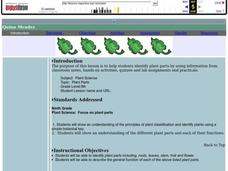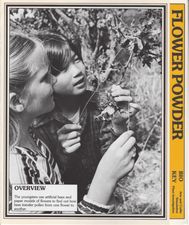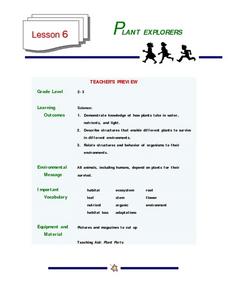Curated OER
Flower Power
Students explore parts of the flower. For this plant biology lesson, students dissect flowers and identify how the seeds are formed. Students take a nature walk to pick flowers for future dissections.
Curated OER
Cell Structure
Students study plant and animal cell components. For this cell lesson students identify parts of a cell, view a PowerPoint presentation and diagram a cell.
Curated OER
Plant Parts
Ninth graders identify plant parts by using different classification methods. In this plant lesson students observe and draw different types of leaves then classify them according to species.
Curated OER
Plant Life Cycle
Fourth graders explore the plant life cycle. They discuss the sequence of events in the life cycle of the plant and illustrate how the life cycle never ends. Students explore the importance of water, sunlight, and nutrients during the...
Curated OER
Edible Plant Parts
Students participate in various activities to discover the six basic types of plants. In groups, they analzye the foods they eat and identify which part they consume. After reading "The Fablous Food Phantom", they create a food phantom...
The Science Spot
Flower Basics
Learn about plants and pollination with a instructional activity about the parts of a flower. After labeling the anatomy of a flower using a word bank, kids explain the difference between self-pollination and cross-pollination, and...
Curated OER
Cells: A First-Hand View
In the first of two activities, your charges prepare wet mount slides of cork and bean sprout cells in imitation of Robert Hooke's historical investigation. An excerpt from his notes is included. Then, investigators compare animal cells...
Curated OER
Which Part of the Great Salt Lake Stinks More?
Students research background knowledge of the Great Salt Lake prior to a field trip. They identify specific wild life at the Great Salt Lake on the field trip and identify the islands in the Great Salt Lake. They present their...
Curated OER
What's Wrong with the Plants?: Biology
Students will initially describe differences between plants which seem healthy and those which appear unhealthy. They will examine the plants and use various techniques to attempt to identify what is causing the unhealthy symptoms. As a...
Curated OER
Designing a Germination Experiment - Part 1
Students experiment with seeds and germination. In this natural science lesson, students discuss the stages of germination. Students engage in a 4 part hands on science activity to view the process of germination.
Curated OER
Algae Part One: An Introduction
Students have the opportunity to view two types of algae under 400x magnification with a compound microscope. They make observations and record their observations through drawings and words. In addition, they identify different qualities...
Curated OER
Planting Parts
Each student plants two lima beans in a plastic cup with a paper towel so they can be observed growing. The beans are misted with a spray bottle, and placed in a warm sunny area. Students view the beans each day for the next two weeks,...
Curated OER
How Do Flowering Plants Reproduce
Young scholars investigate how flowering plants reproduce. They identify and describe the functions of the major sexual organs of a flower and fruit by examining and dissecting flowers and fruit.
Curated OER
Flower Powder
Students collect and observe pollen. For this plant reproduction biology lesson, students use pollen boards to collect pollen from flowers, then match it with the correct paper flowers. Students move artificial bees from flower to flower...
Curated OER
Plant Explorers
Students investigate how plants take in water, nutrients, and light. They create artwork showing how plants survive in different environments.
Curated OER
Making Pretzels
Young scholars explore how people use plants for food. They use pretzels to see how wheat can be turned into food.
Curated OER
Seed Structure and Seed Dispersal
Third graders plant seeds. In this seed structure lesson, 3rd graders identify parts of a seed and plant a lima bean seed. Students discuss and reflect on the process in their journals.
Curated OER
Motte Rimrock Reserve: Lesson Plan for Flora
Students study the flora of Motte Rimrock Reserve while observing organisms in their natural environment. They use a dichotomous key to identify plants.
Curated OER
Plant Lifecycles
Students examine the life cycle of plants. In this plants lesson plan, students identify the various stages of plants and their parts. Students compare the life cycle of a plant with that of an animal. Activities suggested can be...
Curated OER
Life Cycle of Trees
Turn your students into young tree-tectives with this fun science investigation into the life of trees. To begin, a class volunteer gets dressed up in a tree costume as the different parts of trees are introduced. Then, the class learns...
Michigan Farm Bureau
The Little Red Hen
No one will be saying "Not I" with a lesson that combines The Little Red Hen with the life cycle of a wheat stem! After reading the story in your class, pass out wheat stems to your learners and have them examine the plants closely,...
Foundation for Water & Energy Education
How Can Work Be Done with Water Power? Activity B
In this second of three activities, energy engineers plan and create a hydropower dam as they learn how hydroelectric power plants generate electricity. A hydropower puzzle is also included, which can be worked on by teams that finish...
Brigham Young University
Out of the Dust: Guided Imagery
A guided imagery exercise is a great way to get readers thinking about writing. As part of their study of Out of the Dust, Karen Hesse’s 1998 Newbery Medal winning verse novel, class members listen to a reading of one of the poems from...
Alabama Wildlife Federation
Leaf Creatures
The structure of a leaf reveals a lot about the plant it comes from. Young scholars collect and prepare leaves for comparison. After pressing the leaves, they identify the different parts and then use the leaves to complete an art project.

























